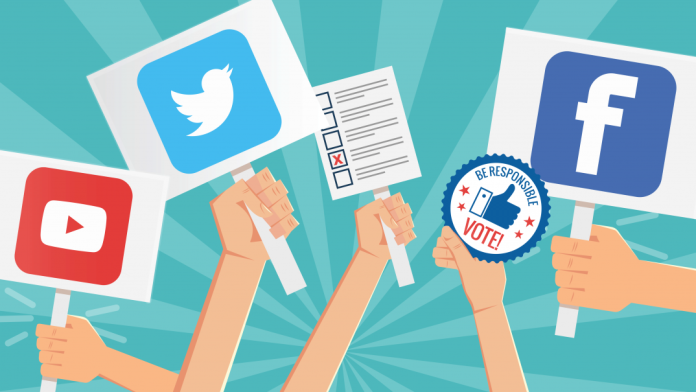
With social media taking the driver’s seat, it has encapsulated all spheres of our public and private lives. It has emerged as the most vitally indispensable tool influencing the entire landscape of Pakistan. With all misconceptions, misgivings, truth, and fallacies surrounding it, it is the biggest reality of the world we now live in. The political arena is no exception, therefore. The impact of social media and its influence on political campaigns navigates into the realms of political branding.
In recent years, social media has revolutionized the way political campaigns are conducted. Platforms like Facebook, Twitter, and Instagram have become vital tools for politicians to connect with constituents, disseminate information, and engage in meaningful conversations. Desultory research into the past few years would show how politicians have leveraged social media to reach a wider audience, mobilize supporters, and create a buzz around their campaigns. From viral campaign videos to targeted advertising, social media has empowered political candidates to communicate their message directly to the people. However, we also witness the challenges and ethical considerations associated with using social media in political campaigns. The spread of misinformation, the creation of echo chambers, and the potential for algorithmic bias are important issues that must be understood and managed effectively.
It is no secret that finances are pivotal in any political campaign. One can examine the impact of budgets on the political landscape of Pakistan, analyzing how campaign funding can shape electoral success viz-a viz challenges faced by candidates with limited resources and the strategies employed by well-funded campaigns. By analyzing the relationship between campaign expenditures and voter perception, we can view insights into the complexities of political branding in the context of financial resources. This examination sheds light on the dynamics between money, perception, and electoral outcomes.
Effective political branding extends beyond campaigns and elections. Today we see how businesses can play a crucial role in building awareness, mobilizing supporters, and shaping public opinion. By engaging with political causes and aligning themselves strategically, businesses can create a positive impact on society while enhancing their own brand reputation. There are various strategies that businesses can employ, such as corporate social responsibility initiatives, partnerships with political campaigns, and leveraging influencers to amplify voices and influence decisions. However, the importance of ethical considerations and the need to avoid any undue influence on political processes should never be allowed. Businesses have a unique opportunity to contribute to the political landscape, but it must be done responsibly and with integrity.
From a marketing perspective, also Social media has a wide range of roles in the art of political branding. Candidate poster designs, slogans, TV commercials, radio advertising, and event management of Jalsas (political rallies) are all integral components of a political campaign’s brand identity. Social media is an instrument that effectively explores the strategies behind crafting memorable visuals and impactful messaging that resonates with voters. Moreover, it discusses the importance of consistency, authenticity, and aligning brand values with the target audience’s aspirations. Building a strong and recognizable political brand requires careful consideration of design elements, messaging, and the overall brand experience.
Political branding also involves navigating power politics and professional and office politics. It is not just about external campaigns but also the intricacies of internal power dynamics. Here the omnipotence of social media can delve into the world of power politics, where politicians and parties vie for influence, alliances, and strategic maneuvering. Additionally, addressing the challenges of office politics, highlighting how politicians navigate internal party dynamics and manage their own personal brand image within political circles. By examining these dimensions, they aim to provide a holistic understanding of the multifaceted nature of political branding.
Throughout our exploration of political branding, it is important to emphasize that the same is committed to upholding the highest ethical standards in its coverage of political branding. As an impartial platform, it has to ensure that it has no political affiliations and does not support any specific candidate or party. It must focus on delivering objective and unbiased insights into the world of political branding. Its readers can trust that the content presented is free from any political or brand affiliations, allowing them to make informed judgments based on facts and analysis.
In a time where political discourse and branding strategies shape our perceptions and decisions, it is crucial to have a clear understanding of the complexities of political branding. The aim should be to equip the audience with the knowledge and insights necessary to navigate the world of politics as a brand. By exploring topics such as social media’s impact on political campaigns, the influence of budgets, the role of businesses, the art of branding, and the nuances of power politics, social media can provide a comprehensive perspective that transcends mere surface-level understanding.
It is essential to approach political branding with a critical lens and a commitment to ethical considerations. The power to shape public opinion should be wielded responsibly and without any hidden agendas. Adherence to impartiality and unbiased reporting ensures that the audience receives accurate and reliable information, free from political bias or affiliation.
In an era where information is abundant but often distorted, the role of social media as a trusted source of insights becomes even more vital. It should strive to present a balanced view of political branding, exploring both its positive potential and potential pitfalls. By doing so, it can empower its audience to engage in informed discussions, make informed choices, and actively participate in the democratic process and towards not only a more enlightening journey but a more informed and engaged citizenry capable of shaping the future of our society.
